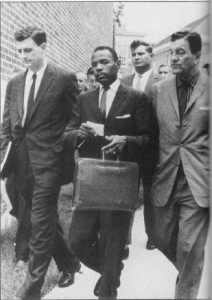Controversy over remembering integration at Old Miss
Posted October 2nd, 2012 by James DeWolf PerryCategory: History Tags: Civil rights movement, Medgar Evers, Thurgood Marshall, University of Mississippi
 Fifty years ago this week, James Meredith enrolled at the University of Mississippi, marking the university’s integration and a civil rights milestone.
Fifty years ago this week, James Meredith enrolled at the University of Mississippi, marking the university’s integration and a civil rights milestone.
Ole Miss is doing a great deal to commemorate this anniversary, yet it has become mired in controversy about whether it is celebrating while ignoring its own past and its role in desegregation.
The doors were open for 50 years yes, but they’d been closed for a century. We don’t want to talk about that do we?
— Historian Charles Eagles, author of The Price of Defiance: James Meredith and the Integration of Ole Miss
The integration of the University of Mississippi
The integration of Ole Miss was not an easy one. Meredith’s application for admission was repeatedly refused by the university, and he required the assistance of civil rights leaders Medgar Evers and Thurgood Marshall, and the support of the NAACP, before the U.S. Supreme Court ruled that Meredith had a right to be admitted to the university.
Even then, President Kennedy had to oversee a massive federal operation to enroll Meredith and permit him to attend classes. After small teams led personally by the chief U.S. Marshal were turned away three times by state officials, the Marshals Service sent in a team of 127 deputy marshals, reinforced by more than 300 Border Patrol agents sworn in as special deputy marshals for the occasion. These law enforcement personnel were backed by National Guard soldiers and military police from the 503rd Military Police Battalion, and supported by the 70th Engineer Combat Battalion out of Fort Campbell, Kentucky.
On the night of September 30, 1962, a violent confrontation ensued:
[The deputy marshals] fought with their backs to the wall. One official compared it to the Alamo.
— William Doyle, author of An American Insurrection: James Meredith and the Battle of Oxford, Mississippi, 1962
In the end, 79 of 127 deputy U.S. marshals were wounded, along with 87 others, and two people lay dead. The next day, however, Meredith was escorted onto campus to enroll and begin attending classes.
Remembering the history of integration and its legacy
The University of Mississippi has been commemorating fifty years of integration with lectures and other public events, including talks by U.S. Attorney General Eric Holder and Harry Belafonte. The campus has been filled with posters celebrating the milestone, including such upbeat slogans as “50 Years of Integration: Opening the Closed Society” and “50 Years of Courage.”
There is much to celebrate in the past fifty years at Old Miss. Integration has become an accepted reality, with a substantial black student population at the university. This year saw the election of the first black woman as president of the student body, and this fall, for the first time, the school’s homecoming queen is black.
Yet University of Mississippi history professor Charles Eagles, author of The Price of Defiance: James Meredith and the Integration of Ole Miss, questions the tenor of the celebration.
Eagles notes that the fifty years of integration being celebrated today was not undertaken voluntarily, and that it was preceded by a century of segregation and institutionalized racism. He argues that at an institution of higher learning, there should be less emphasis on celebrating achievement, and more on the university’s history of segregation and widespread resistance to integration.
It’s like the university is celebrating redemption without confronting and admitting its sin.
Civil rights organizations in Mississippi, meanwhile, have been quoted as saying that this is merely one example of the challenge in the South to remembering slavery and the Jim Crow era. They note that there is still a long way to go to overcome that heritage, and say that celebration needs to be paired with a more robust discussion of the enduring consequences of slavery and segregation.
What do you think? Please offer us your thoughts in the comment space below.



October 2nd, 2012 at 7:03 pm
The importance of learning how to acknowledge individual, societal and institutional misdeeds and harms is vital if we're to truly learn from history and how it reverberates in the present. When do we –as individuals, groups or society–ever truly learn how to stand in the fire in order that we sincerely and adequately admit how we have harmed others over time and space? It strikes me as a necessary, albeit potentially excruciating, practice for healing past harms and remedying current ones. No one likes to be the "bad guy": How might we create an identity frame for conceiving of one's self and one's group in a way that emphasizes integrity and greater humanity through the process of accountability and empathy?
November 16th, 2012 at 12:38 pm
How much time do we really need to spend in self-flagellation for the misdeeds of our forefathers? Are we not allowed to celebrate any great achievement in civil rights, but instead mourn the years previous? Perhaps we should also cancel Independence Day celebrations and instead think ruefully upon the time before when we were oppressed by European states.